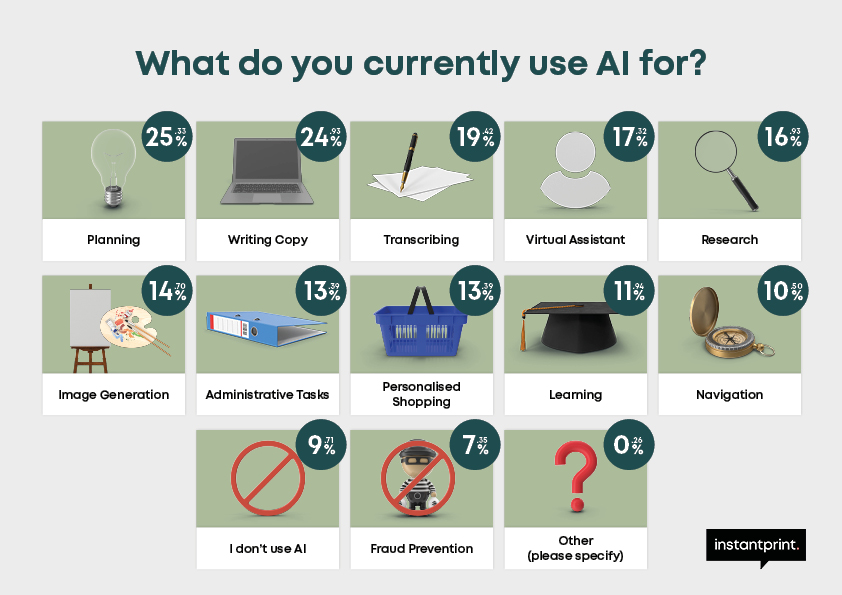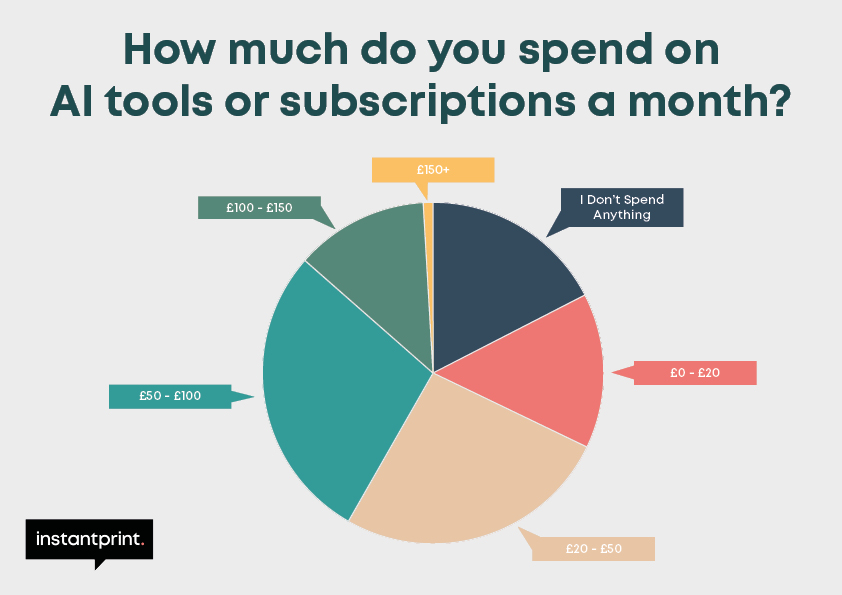From Chat GPT to spelling and grammar tools like Grammarly, AI seems to be everywhere.
AI, short for Artificial Intelligence, refers to the exciting field of computer science that focuses on creating computer systems that can perform tasks that typically require human intelligence.
It involves developing algorithms and techniques that enable machines to mimic and simulate human-like cognitive abilities such as understanding natural language, recognising objects in images, making decisions, and even translating between different languages. AI aims to empower machines with the ability to learn, adapt, and solve complex problems, ultimately enhancing their efficiency and effectiveness in various domains.
As the utilisation of AI continues to rise and the integration of various AI technologies in work environments experiences significant growth, we conducted a survey to explore employees' perspectives on AI and its implications for their jobs. Our survey quizzed over 1,000 office workers in the UK, aiming to uncover their concerns, spending patterns, and examples of AI adoption within their workplace.
Talk Of The Office
It’s probably no surprise that 96.46% of respondents answered ‘yes’ when they were asked if they know what AI (artificial intelligence is)? Only 0.79% responded negatively, and answered ‘no’ whilst 2.76% shared that ‘I've heard of it but I'm not sure’.
For those who answered ‘yes’ 69% were aged 18-34. Of those who answered ‘I've heard of it but I'm not sure’ 48% were aged 35+. It seems that the younger generation are the ones jumping on the AI bandwagon.
While AI appears to dominate conversations around office spaces, the key question remains: Are employees actively incorporating AI into their work responsibilities and if so, how?
Following Suit
We asked our survey respondents if they currently use AI in their business or workplace. 89% shared that they already use it, 5% shared that they don’t use it at all and an interesting 6% shared that they are looking to start incorporating it into their work.
Here, the results showed a similar trend. Among the participants who claimed to be using AI at work, a whopping 71% were between the ages of 18 and 34. On the other hand, among those who admitted to not using AI, a significant 57% were aged 35 and above.
Who’s Using AI?
We delved deeper into our previous responses to find out exactly what industries are making the most of AI.
Top 5 industries using AI:
• Business and Information - 11%
• Education - 10%
• Creative, Arts and Design - 9%
• Marketing, Advertising and PR - 8%
• Finance and Insurance - 7%
Unsurprisingly, industries that already have a strong foundation in working with data and technology are more inclined to embrace the utilisation of AI.
Top 5 industries not using AI:
• Agriculture - 8%
• Non-Profit and Charity - 8%
• Personal Services - 8%
• Leisure - 5%
• Construction, Utilities and Contracting - 5%
It appears that industries characterised by hands-on, labour-intensive operations and limited funding are less inclined to adopt AI in their work environments.
Tech Is A Mans World
When we asked our survey respondents if they currently use AI in their business or workplace we also looked at gender.
A shocking 72% of ‘yes’ respondents were male, compared to those who answered ‘no’, 68% of which were women. It looks like men are the ones making the most of AI in the workplace.
65% of ‘we’re looking to start incorporating it’ were female, potentially trying to seek an AI budget or even permission.
To Embrace Or Eradicate?
When survey participants were asked about their opinions on the future of AI, the results showed a diverse range of perspectives. Around 36% expressed a belief in a positive future for AI but emphasised the need for caution. Another 32% showed enthusiasm and embraced AI, viewing its future positively.
On the other hand, 18% held the view that AI would lead to job displacement, while a surprising 14% expressed concerns about the uncertain nature of AI and advocated for a lack of trust in its potential. Despite the widespread discussions and utilisation of AI, it is evident that a significant portion of the workforce still harbours apprehensions.
Furthermore, age emerged as a prominent factor in shaping opinions. Among those who believed that AI would result in job losses, a third fell within the 35+ age group. In contrast, a significant majority (72%) of individuals aged 18-35 were optimistic and advocated for embracing AI, foreseeing a positive future.
Time To Update Your CV?
When exploring opinions on the future of AI and its impact on job security, we asked respondents whether they are mindful of AI potentially replacing their own or others' jobs in the future. Here's what we found:
67% believe that AI may replace some jobs but not all.
A huge 31%, one in three, think that AI will replace most jobs in the future.
A small proportion of just 3% don't think AI will replace anyone's jobs.
It is natural to feel apprehensive about significant technological advancements, much like when the internet was invented or any other major technological innovation. It's important to note that while jobs may be replaced, new opportunities are continually emerging. In fact, we are already witnessing the emergence of roles such as "AI prompt engineer" and "Natural Language Processing Developer" as AI continues to evolve and take over the workplace.
What Are Workers Using AI For?
We quizzed UK office workers to gain insights into how they are leveraging AI in their work. The results revealed that AI is being utilised across a wide range of tasks, from providing inspiration and assisting with planning to handling more intricate responsibilities such as navigation and fraud prevention. The versatility of AI is evident as it finds application in various aspects of the workplace.
• Planning - 25%
• Writing copy - 25%
• Transcribing - 19%
• Virtual assistant - 17%
• Research - 17%
• Image generation - 15%
• Personalised shopping - 13%
• Administrative tasks - 13%
• Learning - 12%
• Navigation - 11%
• I don't use AI - 10%
• Fraud prevention - 7%
‘Other’ results also showed digital pathology and coding.

Work Smart, Not Hard
Saving time? Doubling output? Increasing sales? These are all areas that AI can help us improve. We asked our respondents to share what using AI is helping them to do.
28% of respondents shared that it helps them to come up with new ideas while 27% shared that it generally helps them to do their job better
It comes as no surprise that 24% highlighted how AI saves them money, while 21% acknowledged its time-saving capabilities.
Furthermore, 22% of respondents found that AI contributes to improving sustainability and reducing their carbon footprint. For 19%, AI has played a role in enhancing the customer experience. Additionally, 7% revealed that AI has aided in improving factory or workplace efficiencies.
Right Tools For The Job
We also asked our respondents to share what AI tools they’ve been using to help them complete tasks in their workplace.
• Chat GPT - 34%
• Midjourney - 23%
• Bard - 21%
• Adobe Firefly - 20%
• Copy.ai - 19%
• Canva AI - 17%
• Grammarly - 15%
• Jasper - 5%
• Other - 1%
As expected, Chat GPT emerged as the top choice among employees, with over a third of respondents utilising this highly talked-about platform in their day-to-day work. Whether it's content creation, research, or planning, it comes as no surprise that Chat GPT ranked first. The platform has gained significant attention across various platforms over recent months, saturating YouTube, LinkedIn, Instagram, and numerous websites, with tips, tricks and hacks for leveraging the platform.
Following closely behind, 23% of votes went to midjourney, particularly favoured by designers and creatives. This AI platform, capable of generating images based on natural language descriptions, has become a noteworthy topic of discussion among AI users since its launch just 11 months ago.
Google's Bard, a real-time data and information provider, secured usage among 21% of respondents. Although it offers up-to-date information unlike Chat GPT, which has a knowledge cutoff of 2021, Bard still requires further time and learning to catch up to the capabilities of Chat GPT. Similarly, Adobe's recently launched Firefly, aiding designers in content creation with a simple prompt, found its place among the utilised AI tools.
Free tools like Copy.ai, Canva AI, and Grammarly were also popular choices among respondents, while paid tools like Jasper appeared to be less favoured. Although the workforce is embracing AI, it seems that they may not be fully inclined to allocate their budgets towards it just yet.
Spend Money To Make Money
Just like with many tools, software, and platforms, sometimes you need to spend a little money to make some. We asked respondents about their spending on AI tools in their workplaces.
• £50 - £100 - 28%
• £20 - £50 - 26%
• I don't spend anything - I only use free AI tools - 17%
• £0 - £20 - 15%
• £100 - £150 - 13%
• £150+ - 1%
28% of respondents allocate a monthly budget of around £50-£100. For comparison, if you consider a team plan on a platform like Jasper, it would typically cost around $99 per month, which converts to a reasonably acceptable £77.
Approximately 26% spend between £20 and £50. The pricing for midjourney falls within the range of $10-$60 (£8-£47).
About 17% of respondents don't spend any money on AI tools and make the most of free platforms like Chat GPT and Copy.ai.
Around 15% allocate a budget ranging from £0 to £20. For comparison, the average paid plan for Grammarly starts at just £10.
Only 13% of respondents spend between £100 and £150, while a mere 1% shared that they spend over £150. It seems that the majority of the UK workforce currently prefers free or budget-friendly tools.

Jack McGlone, Technical Lead at instantprint, commented on the findings:
“AI's advanced algorithms and computational capabilities enable businesses to uncover hidden patterns, identify emerging trends, and gain deeper contextual understanding. Automation and optimisation of repetitive tasks can liberate gives employees their time back, enabling them to focus on higher-value activities, creativity, and problem-solving.”
“However, amidst this transformative journey we’re seeing, companies must exercise caution, ensuring that ethical considerations, transparency, and human oversight guide their AI implementation. By putting people first and integrating with AI as a tool for progress, companies can build a future where innovation and human well-being go hand in hand.”
Embracing AI in your workplace? Worried about what the future holds? Let us know your thoughts on social media by using #instantprintuk!





